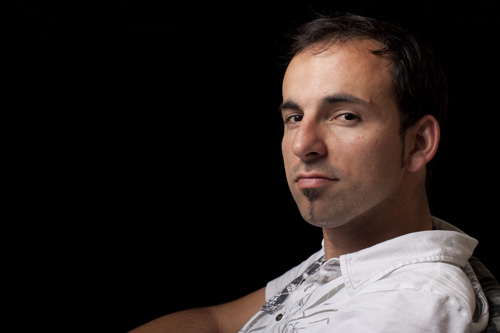From the Bay Area to Bogotá, students count on Federico Ardila for an opportunity to prove they have what it takes to succeed in mathematics.

Photo by May-Li Khoe.
Assistant Professor of Mathematics Federico Ardila writes Carathéodory's Theorem and Farkas' Lemma on a dry-erase board, blanketing the white surface with the lengthy proof. His marker squeaks on the surface as brackets of zeros and ones fill a second board. By the time he has filled a third board, Ardila is speaking a mathematical language shared with the 12 students in his discrete geometry class. As Ardila writes, the only other sound in the room is the faint whirring of an electric motor, as a camera on the back wall pans and zooms on his every move.
Over the course of the next 20 minutes, Ardila explains the proof, then pauses. "You might want to rewind," he says, but not to the students seated in front of him inside Thornton Hall. He is speaking to their 15 classmates 3,700 miles away in Colombia, Ardila's home country. They will review his words later in the week at Universidad de los Andes, where Ardila is also an adjunct professor of mathematics.
The class provides these students as well as others at University of California, Berkeley, and Massachusetts Institute of Technology (MIT) access to a world-class math professor. Ardila, who completed his bachelor's degree and doctorate at MIT, is an expert in combinatorics, a relatively new area of math that studies countable discrete structures. Combinatorics might be used to schedule classes in rooms on a campus without overlap or, say, find the area of a three-dimensional polytope with 20 sides and 12 faces. Though he's a widely published and respected researcher, it's Ardila's dedication to providing educational opportunities that this spring earned him a CAREER grant, the National Science Foundation's most prestigious award for new faculty.
"If you walk around San Francisco you can see the kids and see the future of our country. They just need somebody to inspire them and that drives a lot of my work."
— Federico Ardila
"He's a high-powered research mathematician and sometimes, those kinds of researchers don't get involved in the way that he does," says Sheldon Axler, dean of the College of Science and Engineering.
For Ardila, inspiring students and providing access to education is personal and reflects the chances he received years ago in Colombia. As a 9-year-old elementary school student, Ardila took a test for the Mathematical Olympiad and learned he'd earned the highest score in the country for students his age. He represented his home country four times in the international mathematics competition and in recent years has served on the Mathematical Olympiad advisory board.
"We've had kids from really tough backgrounds take the exam and suddenly they're in the top five in their country and they had no idea," Ardila says. "I've been interested in attracting people from areas where we don't normally find them, both in the Bay Area and Colombia. If you walk around San Francisco you can see the kids and see the future of our country. They just need somebody to inspire them and that drives a lot of my work."
When he's not teaching, Ardila stays busy with a variety of activities. He plays soccer and is part of a DJ collective called La Pelanga that hosts benefits in the Bay Area. On return trips to Colombia, Ardila hunts for African, Latin and Caribbean records in flea markets and out-of-the-way record stores. "I'm a big music nerd," he says. "I try to get some music out there that people don't normally hear. My professor side comes out sometimes—I want people to have fun and show them some new music at the same time."
Teaching an upper-division course to students in two hemispheres isn't easy. Ardila records his lectures using technology originally used by figure skaters to film routines without camera operators. A camera tracks his movement using four heat-sensors positioned around the room. But when lectures end, Ardila's work really begins. On a typical day, Ardila teaches the class at SF State and holds office hours for his American students. He then edits the footage, posts it online and holds separate office hours via Skype for his Colombian students, while also posting discussion questions on an online forum.
"He explains really abstract things, but he has a way of making it look really concrete," says Dido Salazar-Torres, a graduate student at SF State. "When it comes to homework, he likes to challenge us, but he does it to encourage us to work in groups, which is something he really focuses on."
In his online classes, Ardila spends the first half of the semester communicating recent research, and the latter half on a final project that has led to students publishing papers in peer-reviewed journals. As a result of the cooperation, several students have come to SF State from Universidad de los Andes to complete master's degrees at SF State before moving on to doctoral programs at MIT, Cornell and UC Berkeley.
Benjamin Iriarte Giraldo took two online classes from Ardila as an undergraduate in Colombia. His final projects in the class led to two publications in peer-reviewed journals and a master's degree at SF State in 2010.
"Working with students in other countries was difficult, but in math, that's how things work," says Giraldo, now a first-year Ph.D. student at MIT. "Your co-authors could be in another country, so this class was training for real life in mathematics."
Read the sidebar: NSF Grants Adding Up